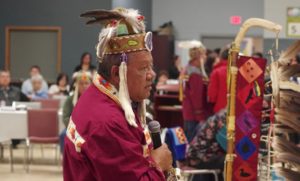Newly elected Grand Council Chief continues path set by his predecessor

By Rick Garrick
FORT WILLIAM FIRST NATION—Newly elected Grand Council Chief Glen Hare plans to continue on with the path set forward by previous grand council chief Patrick Madahbee.
“I’m not coming in to change anything big — we’ve got lots to finish,” Hare says after being selected as Grand Council Chief in a traditional stand up election process on June 6 in Fort William First Nation. “The big one I would like to see, and I asked the chiefs to work with me, is the child well-being law.”
Hare also wants to work with the chiefs on the constitution process.
“We have to have a constitution,” Hare says. “We’ve got to have that so nobody interferes with our business at home.”
Hare wants to work towards synchronized elections for Chiefs and Councils.
“Let’s get away from this two-year, three-year all over the place, all over the map,” Hare says. “Let’s work that out. We’ll be so much stronger.”
Hare called on the Chiefs to contact him whenever they need assistance.
“I literally have the phone next to me in the bedroom,” Hare says. “When it rings, I will answer it. I always have and I always will.”
Hare also plans to continue meeting with community members and Chiefs whenever possible in his new position.

“The people want to see leadership,” Hare says. “When our Anishinabek call, we’ve got to go. If not for our citizens in our communities, we wouldn’t be here. They rely on us. I give you that commitment.”
Hare completed four terms over 12 years as Deputy Grand Council Chief after being first selected during the Anishinabek Nation’s first traditional stand up selection process in 2006.
“It was the first stand up traditional election we had and we’ve carried it on ever since,” Hare says. “It’s so awesome and it’s so strong that our Elder [Gordon Waindubence] ever since then has been asked to do the Chiefs of Ontario stand up election.”
Grand Council Treaty #3 initiated the traditional stand up selection process in 1997 after Treaty #3 executive director Gary Allen’s grandfather Jim Boskaykin had a dream about the process.
“The Chiefs endorsed it,” says Allen, who is currently running for Ontario Regional Chief. “Ogichidaa Francis Kavanaugh, who is now the Ogichidaa in Grand Council Treaty #3, was the first one elected as Grand Chief through the traditional process.”
Hare received 30 votes during the traditional stand up selection process while Whitefish River Chief Shining Turtle received 10 votes.
“It’s been exciting and wonderful and very democratic,” Turtle says. “Glen, congratulations. It’s been fun, it’s been respectful. We have a lot of work to do. I will continue to work hard and we’ll do some wonderful things. Count on my support.”

Although four Regional Deputy Grand Council Chief positions were also up for election, only Red Rock Indian Band Chief Edward Wawia was elected through the traditional stand up election process for the Northern Superior Region. He received five votes while Fort William Chief Peter Collins received four votes.
“It’s a great honour to be selected by the Chiefs of the Robinson Superior,” Wawia says. “There’s lots of work to do and I’m glad the people put their trust behind me. Now I have to show them I can do the work that they put their faith in.”
Joe Miskokomon, from Chippewas of the Thames, was acclaimed for the Southwest Region and Alderville Chief Jim Bob Marsden was acclaimed for the Southeast Region.
Nipissing Chief Scott McLeod was chosen as the interim for the Lake Huron Region.


